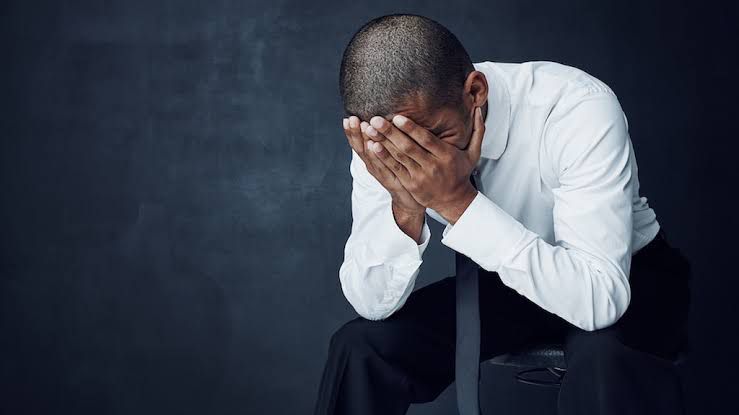“Ask a Nigerian man how he’s doing and you’ll probably hear: ‘I’m fine.’ But beneath that calm, many are fighting quiet wars they don’t have the words for.”
This World Mental Health Week, I spoke with a few men about why it’s still hard to say “I’m not okay,” and with a therapist who helps people bear the weight of silence.
Through their stories, here’s what keeps many Nigerian men from admitting pain and what might finally shift the pattern.
“I’m Fine” — The Stories Beneath the Silence
For David, a law student in the Nigerian Law School, vulnerability is acceptable only with a select few.
“I don’t struggle to say I’m not okay o😂. If I’m close with my friends, I tend to tell them how I feel … It’s when I’m not close enough that I can be just superficial in my answers or say nothing. … image branding generally.”
He admits his answer depends on comfort and image. To him, opening up exposes him to being perceived as weak.. So, he shields the truth, even if only slightly.
OBA Khafre, a tech expert, sees honesty as futile.
“Because it makes no f***ing difference, bro! … people just count yours as excuses. … So imagine saying you’re not okay beside someone with that kind of mentality … you just come off as a whiner …”
His words are sharp with frustration: in a culture that rewards visible success and glosses over struggle, saying “I’m not okay” feels like exposing your downside in public.
Uche’s story is steeped in early suppression.
“Most times I feel like I’m broken, … My friends moved away … Many things hurt me growing up … I find it hard to ask for help even when I need it badly … When people ask if I’m okay, even if I’m not, I just say ‘I’m fine’ …”
He describes childhood overprotection and loss (especially after his grandmother died), crafting a default shell of “fine,” even when his insides disagree.
Different stories, same thread. For men, silence isn’t always pride; sometimes, it’s survival.
TECNO’s Spark Slim and Pova Slim Put Big Batteries Into Thin Frames
TECNO’s new Spark Slim and Pova Slim are taking on Infinix’s Hot 60 Pro+ in the race for the world’s thinnest budget smartphones.
#LOVEISEAZI: A Relationship Timeline of Temi Otedola and Mr Eazi’s love story
The perfect ending to a long lovestory.
11 Surprising Things You Never Knew You Could Do with Vaseline
Soft lips, smooth skin, longer lashes, and squeak-free doors. Vaseline does it all. Here’s how.
What Twitter Thinks: Social Voices on Male Vulnerability
Online, the conversation is messy, honest, and revealing. Memes and threads surface the unspoken reality: many Nigerian men feel they can’t show pain without losing respect or being judged. These social commentaries echo what David, Oba Khafre, and Uche already live.
Beyond the memes and debates lies a much deeper struggle, one that experts say begins early and runs deep.
Expert Insight — Understanding the Silence (with Dr Chente)
Meet Dr. Chente
Dr Chente, popularly known as the Emotions Doctor, is a licensed therapist specialising in grief, trauma, couples therapy, and emotional healing. His work is about helping people find meaning in their broken places, especially those shaped by cultural, religious, or social expectations to stay strong and silent.
“We grow up learning to suppress instead of express… and that unspoken pressure shapes how we handle pain.”
He believes many Nigerian men are exhausted, not just by long days but by emotional neglect.
“The average Nigerian man is tired — not just physically, but emotionally. He’s carrying more than he knows how to name.”
Expectations to provide, protect, succeed without failing pile up. Many have never been taught how to name or share what hurts inside.
From early childhood, boys hear statements like “stop crying like a girl.” To be a man is equated with endurance, not vulnerability.
“Vulnerability becomes weakness. Men learn to protect themselves by pretending not to feel.”
Pain stored inside doesn’t vanish; it transforms. Dr. Chente describes the patterns: emotional retreat, bitterness, relational distance, and sometimes self-harm.
“Silence doesn’t protect them; it erodes them.”
What do the stats say?
-
Globally, men die by suicide at roughly twice the rate of women (BBC).
-
In Nigeria, over 80% of reported suicides are among men (Daily Post).
-
Nigeria’s suicide mortality rate for men was about 5.00 per 100,000 in 2019 (IndexMundi data).
These numbers show the cost is real and measured.
Healing doesn’t demand grand gestures; it needs small moments of safety.
“Men open up when they realise they won’t be shamed for their pain.”
Love, friendship, and family support show up by listening, not fixing. Being present and saying “I’m here” are powerful.
In Closing — Redefining Masculine Strength
Maybe strength isn’t silence at all. Maybe it’s choosing honesty. Saying “I’m not okay” is hard, but it is not less than. When vulnerability is allowed, not punished, healing begins.
So, if you’re a man reading this, try the one truth you’ve been holding back. If someone says it to you, your job isn’t advice; it’s compassion.
“Healing begins the moment a man feels seen, not as a provider or protector, but as a human being.”
We may not change this culture overnight. But starting with one person can ripple out.
ALSO READ: Power Up Your Mental Health
>

